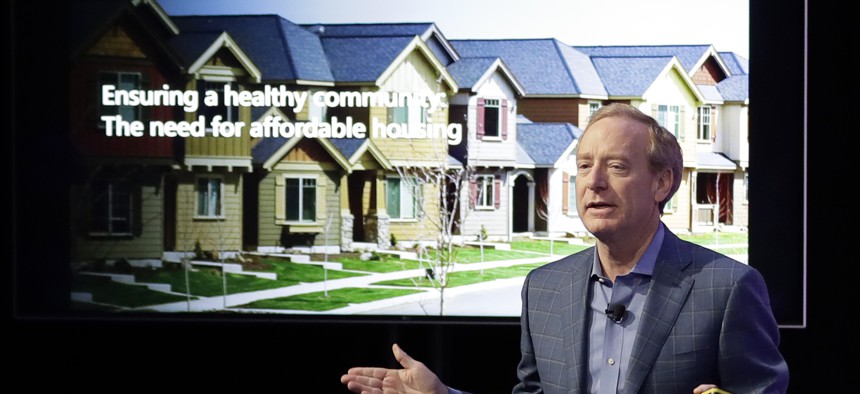Microsoft’s Big Pledge to Help Build Affordable Housing in the Seattle Area

Microsoft Corp. President Brad Smith speaks Thursday, Jan. 17, 2019, during a news conference in Bellevue, Wash., to announce a $500 million pledge to develop affordable housing. AP Photo

Connecting state and local government leaders
The move by the company is “potentially groundbreaking” and an acknowledgment that “government alone cannot really solve” the housing crisis.
Microsoft is pledging to spend $500 million to help build out affordable housing in the Seattle area, as well as tackle the city’s persistent homelessness problem.
With a tech boom driven by Microsoft and Amazon, along with other companies, the housing crisis has deepened in Seattle in recent years. The company’s investment, spent largely over the coming three years, plans to target not only those on the lowest end of the income scale, but also middle-income housing needed for teachers, nurses, police officers and others.
That kind of housing can be a particular challenge, said Al Levine, who for years was the deputy executive director at the Seattle Housing Authority and now teaches at the University of Washington. Construction costs plus steep prices for land, along with an arduous review process, mean that developers can have a hard time with those projects, he said.
"It is very challenging to make the financing work there,” Levine said, while also calling the Microsoft announcement “potentially groundbreaking.”
“It is an acknowledgement of the size of the crisis and the fact that government alone cannot really solve it,” he said.
Levine said he appreciated the company’s promise to allocate $25 million to homelessness, which initially will include $5 million on what he called a long-needed effort to create a consolidated agency to tackle the problem in both Seattle and surrounding King County.
Most of the investment will come in the form of grants and loans to spur housing development. In a blog post on Wednesday, Microsoft President Brad Smith and Chief Financial Officer Amy Hood said that $225 million will be targeted at middle-income housing in six cities east of Seattle. The other $250 million will be spent in the entire region to help build low-income housing.
In an interview with The Seattle Times, Smith said the investments are meant to help build out “tens of thousands of units.” The paper reported that Microsoft believes this to be one of the largest donations in the housing arena by a private company.
The company spent eight months studying the issue to figure out how to dole out their money, Hood and Smith said in their blog post. “Our goal is to move as quickly as possible with targeted investments that will have an outsized impact,” they wrote. “For example, we’ve learned from efforts we’ve studied elsewhere that one effective approach is to provide short-term loans to enable those who want to build affordable housing the time needed to navigate the process of acquiring land from the public sector and raise longer-term construction financing.”
By taking this approach, they said they plan to lend out the money, get paid back and then lend it out again. Smith told The New York Times that the money could go to non-profit developers or a government housing agency.
However, Smith and Hood also pointed to one big problem with fostering more housing in a place where it has become increasingly unaffordable: local zoning rules. Nine mayors in cities outside Seattle have agreed to tackle zoning and other regulations that inhibit housing construction, as well as "providing desirable public land near transit locations" and "creating new tax incentives for construction," they wrote.
Laura Maggi is the Managing Editor of Route Fifty and is based in Washington, D.C.

NEXT STORY: White House Snubs Disaster Relief Funds Proposed in House Bill





